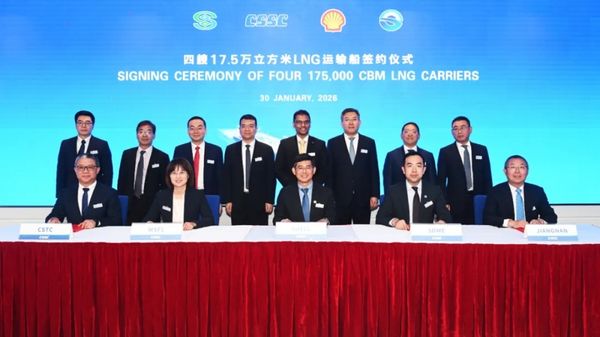

|
Dual-fuel container ship and vehicle carrier fleet reaches 400 vessels
World Shipping Council reports 83% increase in operational dual-fuel vessels during 2025. |
|
|
|
||

|
Lloyd’s Register publishes first guidance notes for onboard hydrogen generation systems
Classification society addresses regulatory gap as shipowners explore producing hydrogen from alternative fuels onboard. |
|
|
|
||

|
Rotterdam bunker industry faces upheaval as new regulations drive up costs and shift volumes
Red III compliance costs and a mass flow meter mandate are creating operational challenges across the ARA region. |
|
|
|
||

|
VPS appoints Neil Chapman as managing director for the Americas
Maritime services company names industry veteran to lead regional operations and client partnerships. |
|
|
|
||

|
Maritime industry shifts towards LNG as alternative fuel enthusiasm stalls
Geopolitical concerns drive shipping leaders to prioritise established fuels over newer alternatives, survey finds. |
|
|
|
||

|
OceanScore reaches $5m annual recurring revenue as emissions compliance demand grows
Hamburg-based firm supports compliance workflows for more than 2,500 vessels as regulations enter operational phases. |
|
|
|
||

|
Jiangnan Shipyard secures order for four LNG carriers from Shell
Chinese yard to build 175,000-cbm vessels for delivery between 2028 and 2029. |
|
|
|
||

|
Island Oil appoints Varsha Sudheer as senior trader in Dubai
Marine fuel supplier strengthens trading platform with new hire at recently established UAE hub. |
|
|
|
||

|
Bitoil Group seeks bunker trader for Dubai operations
Dubai-based company is recruiting for a senior bunker trader role to manage global fuel sales and procurement. |
|
|
|
||

|
Uni-Fuels seeks bunker traders for new London operation
Singapore-headquartered firm advertises position as part of UK expansion. |
|
|
|
||
| Verifavia becomes first IMO DCS verifier for Liberia-flagged ships [News & Insights] |
| Verifavia exceeds 1,000 ships under EU MRV assessment [News & Insights] |
| Verifavia receives accreditation as a global EU MRV verifier [News & Insights] |
| Gap analysis for Dynacom ahead of 2017 MRV regulation [News & Insights] |
| Emission Monitoring System fully certified [News & Insights] |